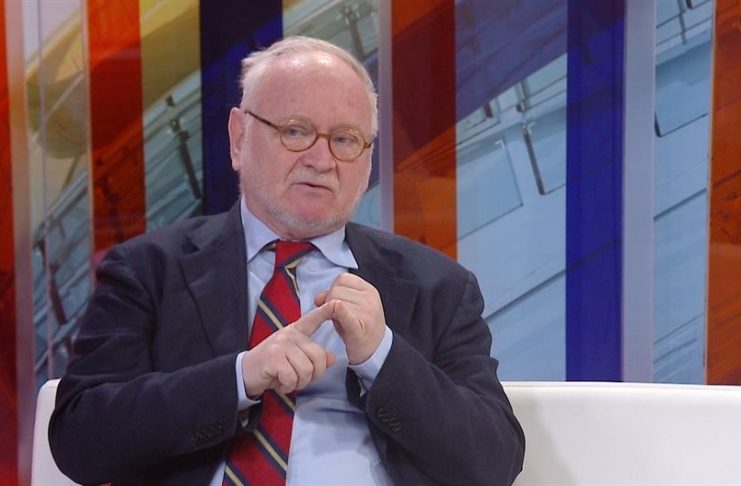The staged scandals against Montenegrin President Milo Đukanović began in 1993, when, as prime minister at the time, he became the protagonist of a column in a Belgrade magazine because of the policies he pursued, which was then recognized as “separatist” in certain Belgrade circles. “Duga” was written by the wife of the President of Serbia, Mira Marković. In the mentioned and, at that time very influential, texts of Professor Marković, Prime Minister Đukanović was not only called a Montenegrin separatist, but he was also given all those labels that would later – from Nacional, Dan, Vijesti, to Vanja Ćalović Marković – be recycled and perfected to unimaginable proportions.
After the October 5 changes in Belgrade and the overthrow of Slobodan Milošević in 2000, it became clear that Montenegro would follow the path of independence and exit from Yugoslavia, and that the then Montenegrin President Milo Đukanović would lead the project.
In the spring of 2001, the Croatian weekly “Nacional” launched the so-called “Tobacco Affair”. Nacional publishes a text transmitted by Podgorica's Dan, a newspaper which, as it is written in the book “Vojna tajna” (“Army secret”), was founded by KOS (counterintelligence service) of the Yugoslav Army for the purpose of propagating the policy of the then political and military leadership of Serbia. We remind you that this policy was later tried and adjudicated at the Hague War Crimes Tribunal.
The main topic of the mentioned newspaper articles was the President of Montenegro Milo Đukanović and the Prime Minister of Serbia Zoran Đinđić, who are accused of cigarette smuggling. In a later statement for the media, one of the authors of the Nacional series, journalist Jasna Babić, admitted that the whole affair was “cooked” in the office of the then president of the FRY, Vojislav Koštunica, stated for Gradska TV, the Deputy Prime Minister of Serbia from that period, Žarko Korać.
“I remember that the Minister of Agriculture in Đukanović's Government, Branko Avramović, was arrested at that time and accused of smuggling fertilizer, which later turned out to have been smuggled by Momir Bulatović‘s brother. Avramović was released, the goal of the affair was to reflect on Đukanović in order to remove him from the position of prime minister,” said Korać.
The first major affair to shake Montenegro was the “tobacco” affair in 1997. An investigation was launched in Bari into cigarette smuggling from Montenegro to Italy from 1994 to 2002, involving 15 people, including Milo Đukanović. The then Prime Minister of Serbia, Zoran Đindjić, was also mentioned in the affair.
Korać told Gradska TV that it was an obvious example of how a media campaign is paid to achieve certain political goals.
“For us, it was an example, and a very clear example, in order to protect some economic interests, corrupt tabloids are used, where you can organize any kind of campaign you want for money, which aims to compromise political figures.”
During 2002, the Parliament of Montenegro formed a commission to establish the facts about cigarette smuggling and the alleged involvement of the state leadership.
Đukanović then sent a letter to the commission in which, among other things, he wrote:
“These are naked untruths, fabrications and fiction, without trying to prove any of these allegations, calculated on my moral and political discredit.”
After resigning from the post of Prime Minister, Milo Đukanović gave a statement to the competent Italian authorities in mid-2008 in Bari at his personal request. Prosecutor Giuseppe Shelzi eventually dropped the investigation against Đukanović. The court epilogue against the other actors is that the court in Bari was acquitted of all charges of tobacco smuggling and mafia association.
On the eve of the 2002 presidential election, Moldovan S.C. identified then-Deputy Supreme State Prosecutor Zoran Piperović and three others as organizers of forced prostitution. President Milo Đukanović was also questioned, although the Moldovan citizen did not mention him directly. A few years later, Đukanović said the trafficking scandal was created by an intelligence service hostile to Montenegrin statehood, as confirmed by Korać.
“I want to be very precise, I'm not saying that the unfortunate woman, a Moldovan, was not abused and exploited, but the affair that was produced, which was directly attributed to President Milo Đukanović, was done primarily by one foreign intelligence service, I can't say which, and it had the direct goal of influencing the credibility of the people who lead Montenegro in order to prevent a referendum on independence,” Korać said.
Twelve years later, the High Court, following Piperović's lawsuit, convicted S. Č. to one year in prison for giving false testimony. A warrant was issued for her, but to date, she has not been found.
